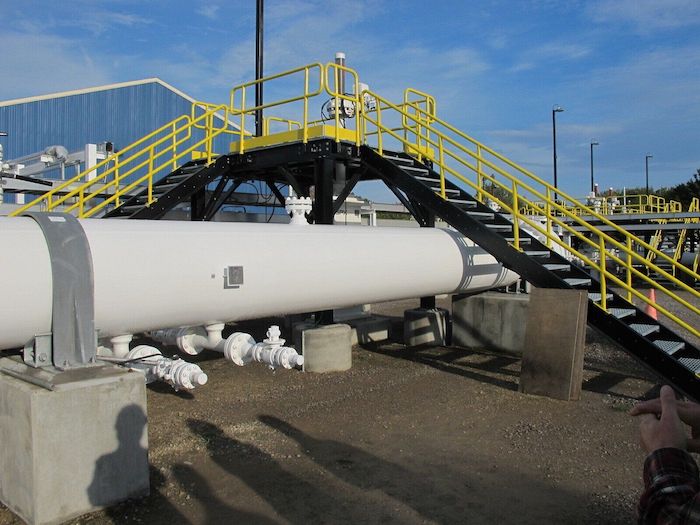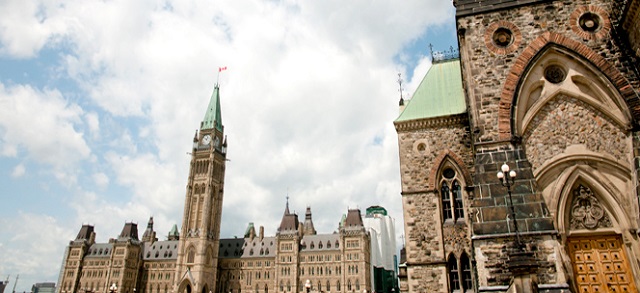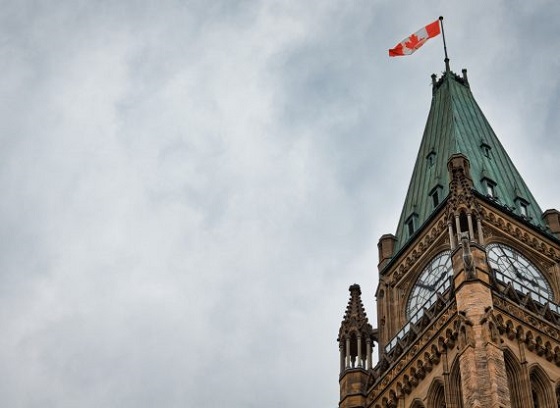Energy
Enbridge punches back on Line 5 challenge: ‘Nothing but counter-factual speculation’

This photo taken in October 2016 shows an aboveground section of Enbridge’s Line 5 at the Mackinaw City, Mich., pump station. The Bad River Band of the Lake Superior Chippewa wants a federal judge in Wisconsin to order the pipeline closed, fearing a rupture on its territory due to spring flooding. THE CANADIAN PRESS/AP-John Flesher
By James McCarten in Washington
Michigan joined the Line 5 legal fray unfolding just across state lines Wednesday as lawyers for Enbridge Inc. and an Indigenous band prepared to square off over whether the controversial cross-border pipeline should be shut down.
The stage is set for oral arguments Thursday in the Wisconsin capital of Madison as a federal judge contemplates whether to order the taps turned off and the pipeline’s contents purged to forestall a watershed-fouling rupture.
That hearing will now also include lawyers fighting a similar legal battle with Enbridge in Michigan, where Attorney General Dana Nessel has so far been thwarted in her three-year campaign to seal off Line 5 for good.
The Bad River Band of the Lake Superior Chippewa, through whose northern Wisconsin territory the line runs, has filed a motion arguing that spring flooding along the riverbanks has rendered the risk of a breach too great to ignore.
Nonsense, Enbridge argues back in an opposition brief that takes direct aim at the band’s claims of a looming environmental emergency, as well as the “drastic remedy” its lawyers are requesting.
“Despite having to prove both liability and grounds for an injunction, the band has done neither. The motion must therefore be denied,” the brief reads, describing their argument as “alarmist” and “counterfactual speculation.”
“No release of oil is ‘ready to take place,’ ‘happening soon,’ or ‘real and immediate.'”
The 50-page filing includes among its exhibits an email exchange between Enbridge and the band’s natural resources officials to support its argument that the band has been unwilling to allow the company to do any remedial work.
“This court should contrast the evidence before it of Enbridge’s persistent efforts and overtures to reach a solution … with the band’s refusal to meaningfully engage or act.”
Even if the risk was high, shutting down the pipeline would not be the appropriate remedy, Enbridge says, pointing to a court-ordered contingency plan that spells out the steps it would take if the threat were indeed urgent.
“Enbridge will pre-emptively purge and shut down the line well in advance of any potential rupture,” the brief says, adding that the area remains under constant 24-hour video surveillance.
“Any flooding and erosion has not, and would not, catch Enbridge by surprise.”
Heavy flooding that began in early April washed away significant portions of the riverbank where Line 5 intersects the Bad River, a meandering, 120-kilometre course that feeds Lake Superior and a complex network of ecologically delicate wetlands.
The band has been in court with Enbridge since 2019 in an effort to compel the pipeline’s owner and operator to reroute Line 5 around its traditional territory — something the company has already agreed to do.
But the flooding has turned a theoretical risk into a very real one, the band argues, and it wants the pipeline closed off immediately to prevent catastrophe.
Line 5 meets the river just past a location the court has come to know as the “meander,” where the riverbed snakes back and forth multiple times, separated from itself only by several metres of forest and the pipeline itself.
At four locations, the river was less than 4.6 metres from the pipeline — just 3.4 metres in one particular spot — and the erosion has only continued.
Michigan, led by Nessel, has been arguing since 2019 that it’s only a matter of time before Line 5 leaks into the Straits of Mackinac, the ecologically delicate waterway where it crosses the Great Lakes.
“The alarming erosion at the Bad River meander poses an imminent threat of irreparable harm to Lake Superior which far outweighs the risk of impacts associated with a shutdown of the Line 5 pipeline,” she argues in her brief.
“Without judicial intervention, it is likely that this irreparable harm will be inflicted not only on the band, but also on Michigan, its residents, and its natural resources.”
The economic arguments against shutting down the pipeline — which carries 540,000 barrels of oil and natural gas liquids daily across Wisconsin and Michigan to refineries in Sarnia, Ont. — are by now well-known.
Its proponents, including the federal government, say a shutdown would cause major economic disruption across Alberta, Saskatchewan and the U.S. Midwest, where Line 5 provides feedstock to refineries in Michigan, Ohio and Pennsylvania.
It also supplies key refineries in Ontario and Quebec, and is vital to the production of jet fuel for major airports on both sides of the Canada-U.S. border, including Detroit Metropolitan and Pearson International in Toronto.
“The implications (of a shutdown) are significant — not only to Pearson airport, not only to the Detroit airport, but to our mutual economies,” Transport Minister Omar Alghabra said Wednesday on Parliament Hill.
Talks about possible contingency plans have been taking place, he added, though he hinted at something Enbridge and pipeline experts have been saying for years: there are no real alternatives.
“There’s been ongoing discussion,” Alghabra said. “But I can tell you that our focus is making sure that Line 5 continues operations.”
That was the idea behind a lengthy statement issued Tuesday by the Canadian Embassy, which warned of severe economic consequences as well as potential ramifications for bilateral relations were the line to close.
“The energy security of both Canada and the United States would be directly impacted by a Line 5 closure,” the statement said. Some 33,000 U.S. jobs and US$20 billion in economic activity would be at stake, it added.
“At a time of heightened concern over energy security and supply, including during the energy transition, maintaining and protecting existing infrastructure should be a top priority.”
Talks have been ongoing for months under the terms of a 1977 pipelines treaty between the two countries that effectively prohibits either country from unilaterally closing off the flow of hydrocarbons.
Nonetheless, the embassy’s statement and the Enbridge brief tacitly acknowledge that the prospect of a shutdown order is very real.
In Enbridge’s case, the brief pre-emptively asks the judge to grant a stay of 30 days, should an injunction be ordered, to give lawyers time to mount an appeal.
And if “this specific, temporary flood situation” results in a shutdown, the embassy says, Canada expects the U.S. to comply with the treaty, “including the expeditious restoration of normal pipeline operations.”
This report by The Canadian Press was first published May 17, 2023.
Daily Caller
UN Chief Rages Against Dying Of Climate Alarm Light


From the Daily Caller News Foundation
The light of the global climate alarm movement has faded throughout 2025, as even narrative-pushing luminaries like Bill Gates have begun admitting. But that doesn’t mean the bitter clingers to the net-zero by 2050 dogma will go away quietly. No one serves more ably as the poster child of this resistance to reality than U.N. chief Antonio Guterres, who is preparing to host the UN’s annual climate conference, COP30, in Brazil on Nov. 10.
In a speech on Monday, Guterres echoed poet Dylan Thomas’s advice to aging men and women in his famed poem, “Do not go gentle into that good night:”
Do not go gentle into that good night,
Old age should burn and rave at close of day;
Rage, rage against the dying of the light.
Dear Readers:
As a nonprofit, we are dependent on the generosity of our readers.
Please consider making a small donation of any amount here.
Thank you!
Though wise men at their end know dark is right,
Because their words had forked no lightning they
Do not go gentle into that good night.
Seeing that his own words have “forked no lightning,” Guterres raged, raged against the dying of the climate alarm light.
“Governments must arrive at the upcoming COP30 meeting in Brazil with concrete plans to slash their own emissions over the next decade while also delivering climate justice to those on the front lines of a crisis they did little to cause,” Guterres demanded, adding, “Just look at Jamaica.”
Yes, because, as everyone must assuredly know, the Earth has never produced major hurricanes in the past, so it must be the all-powerful climate change bogeyman that produced this major storm at the end of an unusually slow Atlantic hurricane season.
Actually, Guterres’ order to all national governments to arrive in Belem, Brazil outfitted with aspirational plans to meet the net-zero illusion, which everyone knows can and will never be met, helps explain why President Donald Trump will not be sending an official U.S. delegation. Trump has repeatedly made clear – most recently during his September speech before the U.N. General Assembly – that he views the entire climate change agenda as a huge scam. Why waste taxpayer money in pursuit of a fantasy when he’s had so much success pursuing a more productive agenda via direct negotiations with national leaders around the world?
“The Green New Scam would have killed America if President Trump had not been elected to implement his commonsense energy agenda…focused on utilizing the liquid gold under our feet to strengthen our grid stability and drive down costs for American families and businesses,” Taylor Rogers, a White House spokeswoman, said in a statement to the Guardian. “President Trump will not jeopardize our country’s economic and national security to pursue vague climate goals that are killing other countries,” she added.
The Guardian claims that Rogers’s use of the word “scam” refers to the Green New Deal policies pursued by Joe Biden. But that’s only part of it: The President views the entire net-zero project as a global scam designed to support a variety of wealth redistribution schemes and give momentum to the increasingly authoritarian forms of government we currently see cracking down in formerly free democracies like the U.K., Canada, Germany, France, Australia and other western developed nations.
Trump’s focused efforts on reversing vast swaths of Biden’s destructive agenda is undoing 16 years of command-and-control regulatory schemes implemented by the federal government. The resulting elimination of Inflation Reduction Act subsidies is already slowing the growth of the electric vehicles industry and impacting the rise of wind and solar generation as well.
But the impacts are international, too, as developing nations across the world shift direction to be able to do business with the world’s most powerful economy and developed nations in Europe and elsewhere grudgingly strive to remain competitive. Gates provided a clear wake-up call highlighting this global trend with his sudden departure from climate alarmist orthodoxy and its dogmatic narratives with his shift in rhetoric and planned investments laid out in last week’s long blog post.
Guterres, as the titular leader of the climate movement’s center of globalist messaging, sees his perch under assault and responded with a rhetorical effort to reassert his authority. We can expect the secretary general to keep raging as his influence wanes and he is replaced by someone whose own words might fork some lightning.
David Blackmon is an energy writer and consultant based in Texas. He spent 40 years in the oil and gas business, where he specialized in public policy and communications.
Daily Caller
US Eating Canada’s Lunch While Liberals Stall – Trump Admin Announces Record-Shattering Energy Report


From the Daily Caller News Foundation
By Audrey Streb
The Department of Energy (DOE) touted a report on Wednesday which states that America broke records in liquefied natural gas (LNG) exports.
The U.S. became the first country to export over 10 million metric tonnes of LNG in one month in October, Reuters reported on Monday, citing preliminary data from the financial firm LSEG. The DOE posted on X on Wednesday that “there are big opportunities ahead for U.S. natural gas” and has consistently championed LNG in a sharp departure from former President Joe Biden’s crackdown on the resource.
“The fact that America’s oil and gas industry was able to pass this stunning milestone is impressive considering all the roadblocks to progress which were thrown up by the Biden administration,” David Blackmon, an energy and policy writer who spent 40 years in the oil and gas business, told the Daily Caller News Foundation. “It is a testament to both the resilience and innovative mindset of the industry and to the phenomenal wealth of America’s natural gas resource.”
Dear Readers:
As a nonprofit, we are dependent on the generosity of our readers.
Please consider making a small donation of any amount here.
Thank you!
🗣️RECORD BREAKING: For the first time, U.S. LNG exports are projected to surpass 10 million metric tons in a single month. There are big opportunities ahead for U.S. natural gas!
— U.S. Department of Energy (@ENERGY) November 5, 2025
Two facilities in Louisiana and Texas are responsible for the LNG export surge, according to Reuters. The U.S. LNG industry emerged as an energy sector giant in recent decades, with America now leading the world in LNG exports after being projected to be a net importer as late as 2010, according to S&P Global.
The Biden administration enacted a freeze on new LNG export permits and “intentionally buried a lot of data and released a skewed study to discredit the benefits of American LNG,” the DCNF previously reported. The environmental lobby applauded Biden’s January 2024 freeze on new LNG export terminals, though critics argued that the policy stalled investment, would not reduce emissions and undermined America’s global strategic interests.
In contrast, President Donald Trump sought opportunities to bolster LNG and reversed the new permit pause through a day-one executive order. Some energy policy experts told the DCNF that the reported milestone highlights the resiliency of the industry and the benefit of Trump’s “American energy dominance” agenda.
-

 Economy2 days ago
Economy2 days agoWelcome to the Energy Humanist Club! Bill Gates breaks the moral monopoly against fossil fuels
-

 Business2 days ago
Business2 days agoBudget 2025 continues to balloon spending and debt
-

 Agriculture2 days ago
Agriculture2 days agoDanish Cows Collapsing Under Mandatory Methane-Reducing Additive
-

 Business2 days ago
Business2 days agoFederal budget: Carney government posts largest deficit in Canadian history outside pandemic
-

 Economy2 days ago
Economy2 days agoThe True Cost of Mark Carney’s Ineffective Green Energy Sinkhole
-

 Censorship Industrial Complex1 day ago
Censorship Industrial Complex1 day agoHow the UK and Canada Are Leading the West’s Descent into Digital Authoritarianism
-

 Business1 day ago
Business1 day agoCapital Flight Signals No Confidence In Carney’s Agenda
-

 International1 day ago
International1 day agoThe capital of capitalism elects a socialist mayor









